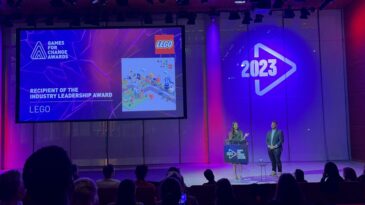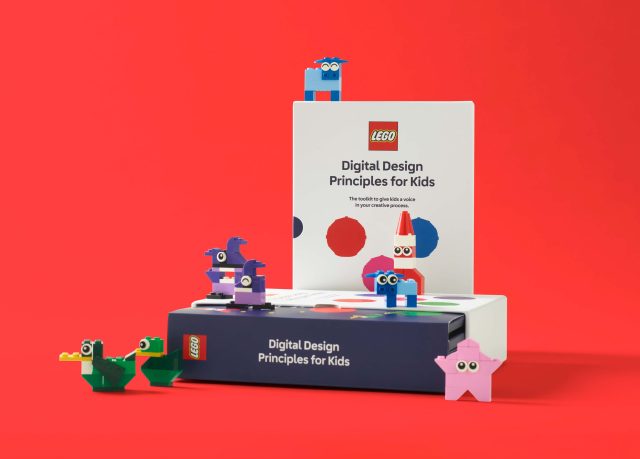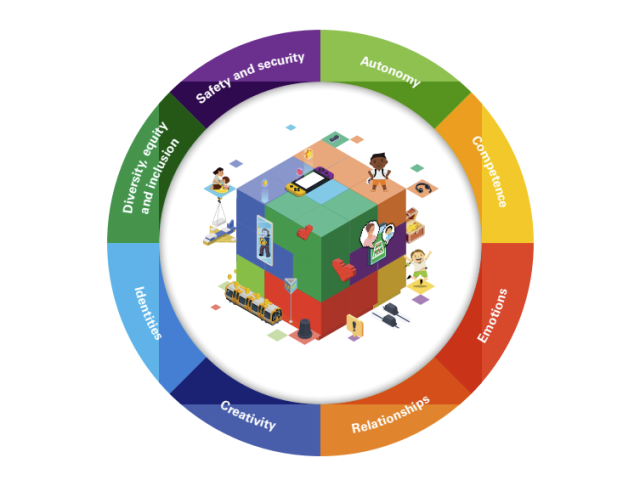The Cooney Center was thrilled to celebrate the 20th Anniversary of the Games for Change Festival alongside an incredible community of thoughtful people dedicated to making games and the world better. We always learn so much at the festival and make so many important connections that help us to advance our work. This year was no exception.
The theme of the Cooney Center’s participation in the festival this year was designing digital play for well-being.

Designing Digital Play for Well Being with Kevin Bedeau, Jeffrey Burrell, Carolina Giuga, and Michael Preston (L-R)
Why focus on well-being? Jeff Burrell, Global Head of Social Impact at Riot Games and panelist at the session moderated on July 18 by the Cooney Center’s Michael Preston summed it up perfectly. “If we’re able to make [digital] places where everybody feels like they’ve got a voice, that there is a space for them, they can engage with their friends and make new friends in a safe and healthy way, that will encourage them to continue to play games and to be multigenerational, to invite their parents, to invite their cousins.” By focusing upstream on designing play that contributes to digital thriving, Jeff added, we have an opportunity to make an “outsized impact, not only to the 3 billion people who play games, but to the 90% of young people who are in digital spaces as well”.
For the many designers in the audience who didn’t need to be convinced that designing for well-being is important, the key question is how to do it!

Michael Preston, Carolina Giuga, Jeffrey Burrell, and Kevin Bedeau
Panelist Kevin Bedau, Head of Product at the Scratch Foundation pointed out that “When you’re looking at something that’s more subtle, like the outcomes that relate to well-being, having a guidepost to understand how the interactions in concert contribute to these particular outcomes is really helpful”.
At Scratch, Kevin said that they use “rubrics and approaches for Intentional design as a way to codify not just how you approach innovation and developing new products and features, but also ways to evaluate where and how what you’re building is contributing to the indicators.” Scratch is now in the process of adapting their rubrics and evaluation processes to help them create products that contribute to kids’ well-being and then measure if the design truly has been effective in doing so.
For panelist Carolina Giuga, Senior Director, Government & Public Affairs, Americas at the LEGO Group “the how” is all about asking kids themselves. “When we talk about being child-centric, it is not bringing in kids to test out your product. It is bringing them to codesign with you,” Carolina said.”So one of the questions that our internal team likes to ask the kids when we bring them on board is, if you were in control, what would you change? And it’s mind-blowing, the type of answers that we have and how that has impacted the direction that we’re going with a project.” For example, the LEGO Group worked with kids to develop the emoji keyboard used to help young children communicate their feelings in the social media app LEGO Life.
The following day, more than 50 Games for Change attendees had a chance to try their hand at “building” digital play for well-being at a workshop hosted by the Cooney Center, The LEGO Group, and the Fair Play Alliance.

Participants were invited to share their design ideas at the workshop hosted by the Cooney Center, the LEGO Group, and the Fair Play Alliance
After learning about the well-being framework developed by the Responsible Innovation in Technology for Children (RITEC initiative) and the practical approach being taken by the Digital Thriving project, the very enthusiastic participants created prototypes of digital play experiences to promote various aspects of well-being.
One example incorporated candles into their game to encourage young players to breathe, thereby helping them with “emotional regulation” (one of the well-being outcomes from the RITEC framework).
Another group inspired by Playbook for Digital Thriving cookbook-like design instructions envisioned an island game that helped to create meaningful relationships and encourage collaboration between players by allowing them to share biographical information with each other.
We wrapped up our time at the Festival by cheering for all of the Games for Change Award Winners, including Hall of Change Award winner and former Cooney Center Board Member Alan Gershenfeld and Industry Award winner, the LEGO Group. The LEGO Group was recognized, in part, for their co-founding of the RITEC project of which the Cooney Center is honored to be one of the partners.

Congratulations to our partners at The LEGO Group for the Industry Award at the Games for Change Festival
We look forward to continued fruitful collaborations with the Games for Change community – here’s to the next 20 years and all of the progress we will make together!


